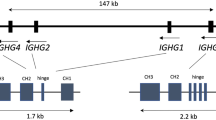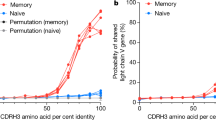Abstract
IN recent publications, Cohen1 and Cohen and Porter2 have presented evidence that light chain preparations from partially reduced and iodoacetamide-alkylated γ-globulins of several species are heterogeneous. In glycine-urea starch-gel electrophoresis, pH 7–8, some eight to ten electrophoretically distinct bands were separated. Under similar electrophoretic conditions the heavy (γ) chains migrated as a diffuse band showing approximately the same spread as the original γ-globulin. In contrast to the light chains, the heavy chains did not give a band pattern.
This is a preview of subscription content, access via your institution
Access options
Subscribe to this journal
Receive 51 print issues and online access
$199.00 per year
only $3.90 per issue
Buy this article
- Purchase on Springer Link
- Instant access to full article PDF
Prices may be subject to local taxes which are calculated during checkout
Similar content being viewed by others
References
Cohen, S., Biochem. J., 88, 2P (1963).
Cohen, S., and Porter, R. R., Biochem. J., 90, 278 (1964).
Fleischman, J. B., Pain, R. H., and Porter, R. R., Arch. Biochem. Biophys., Suppl. 1, 174 (1962).
Sjöquist, J., and Vaughan, jun., M. H. (unpublished observations).
Edelman, G. M., and Poulik, M. D., J. Exp. Med., 113, 861 (1961).
Author information
Authors and Affiliations
Rights and permissions
About this article
Cite this article
SJÖQUIST, J. Heterogeneity of Heavy (γ) Chain Preparations from Human γG-Immunoglobulins. Nature 210, 1182–1183 (1966). https://doi.org/10.1038/2101182b0
Issue Date:
DOI: https://doi.org/10.1038/2101182b0
Comments
By submitting a comment you agree to abide by our Terms and Community Guidelines. If you find something abusive or that does not comply with our terms or guidelines please flag it as inappropriate.



